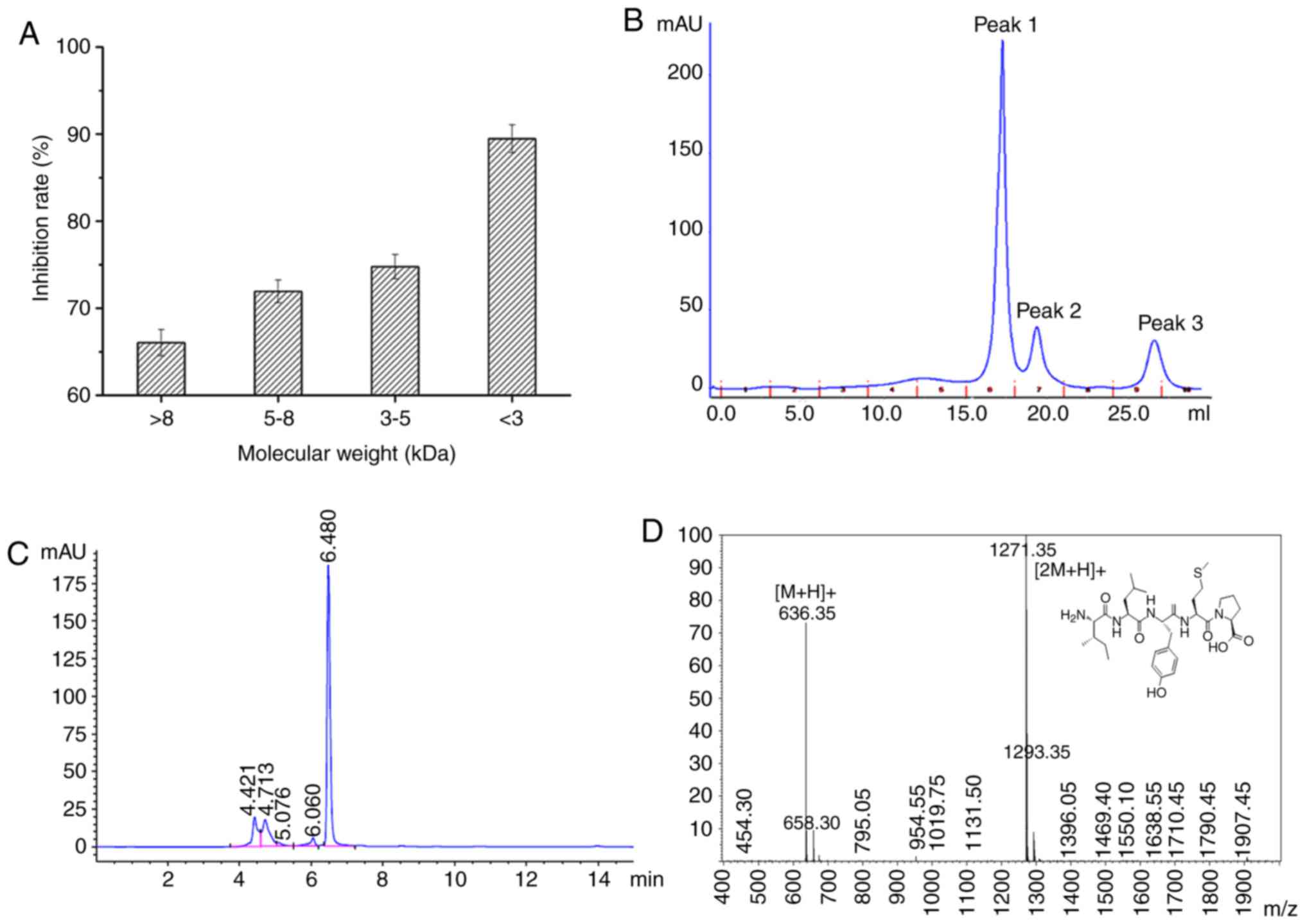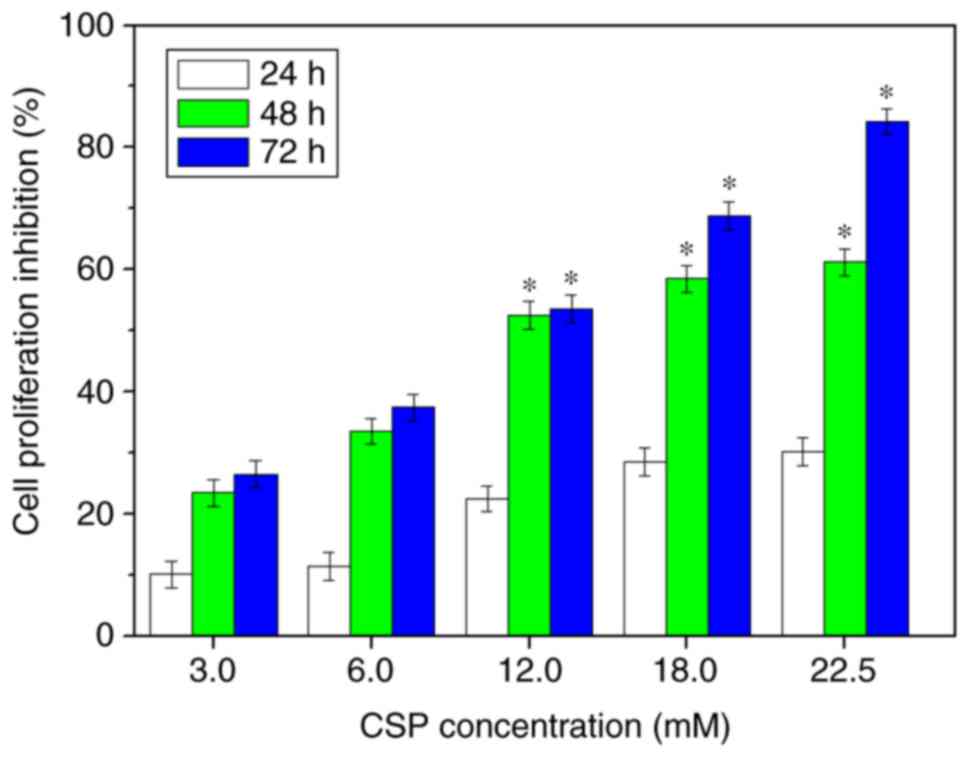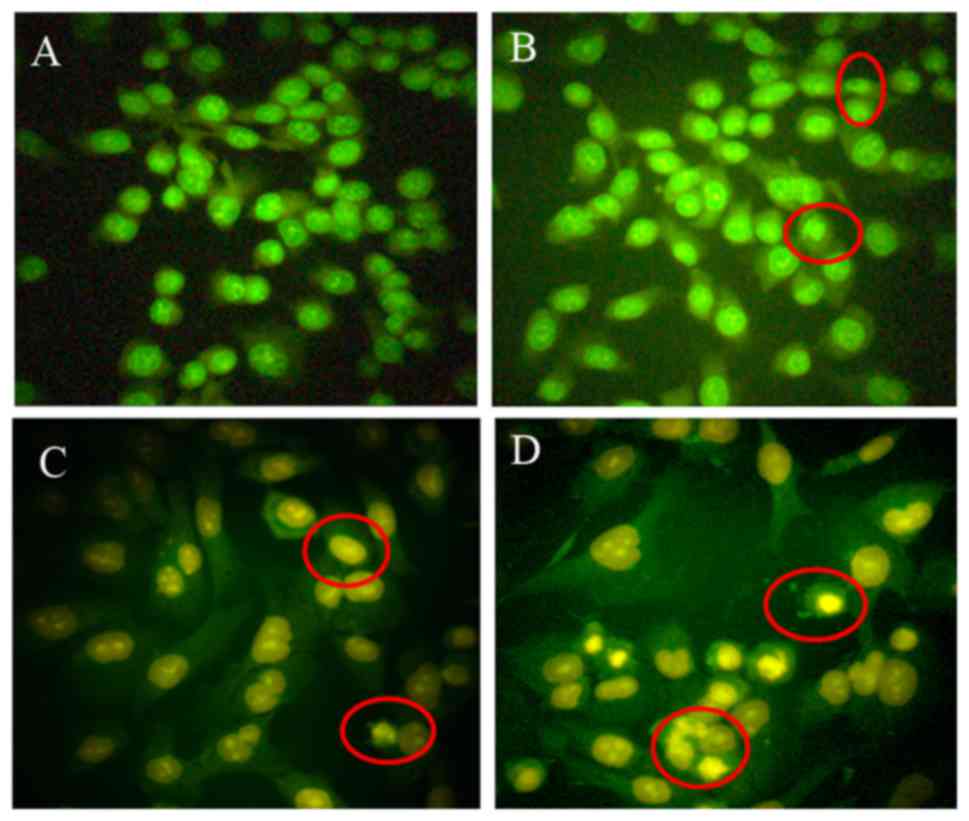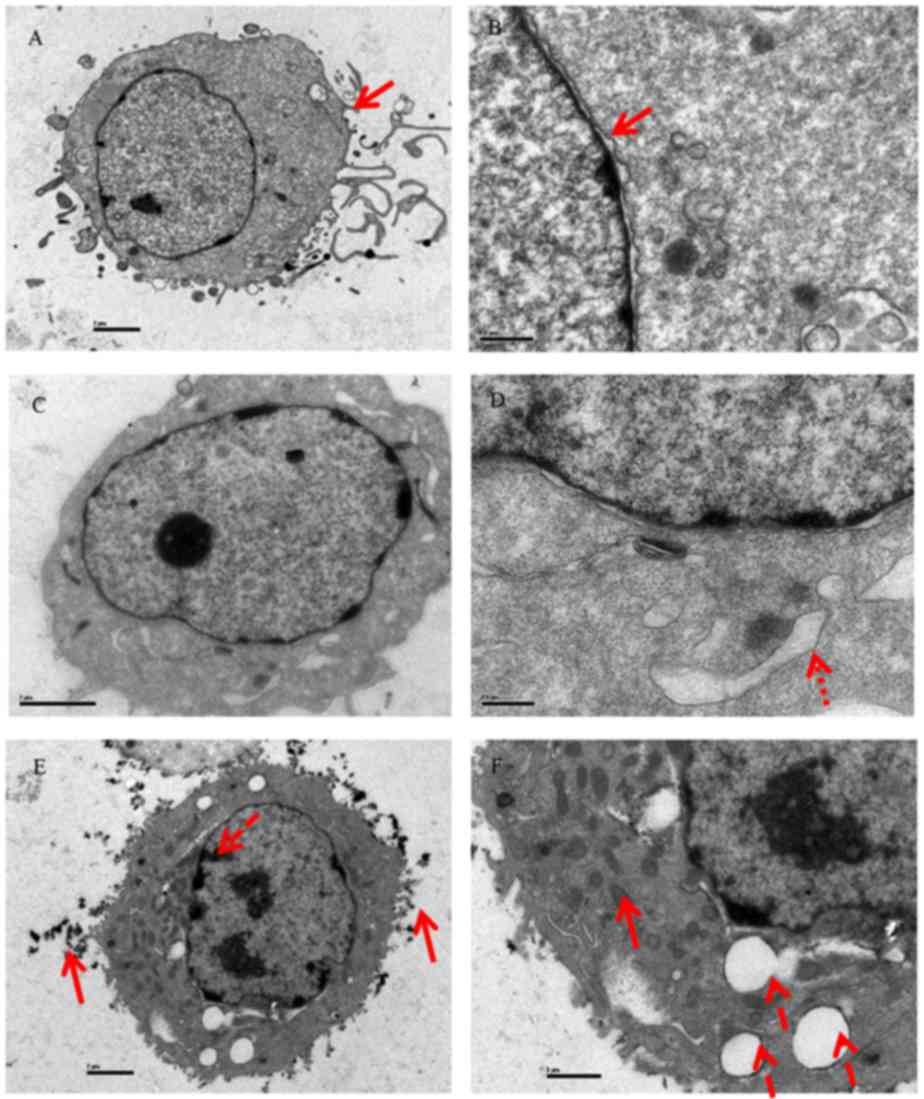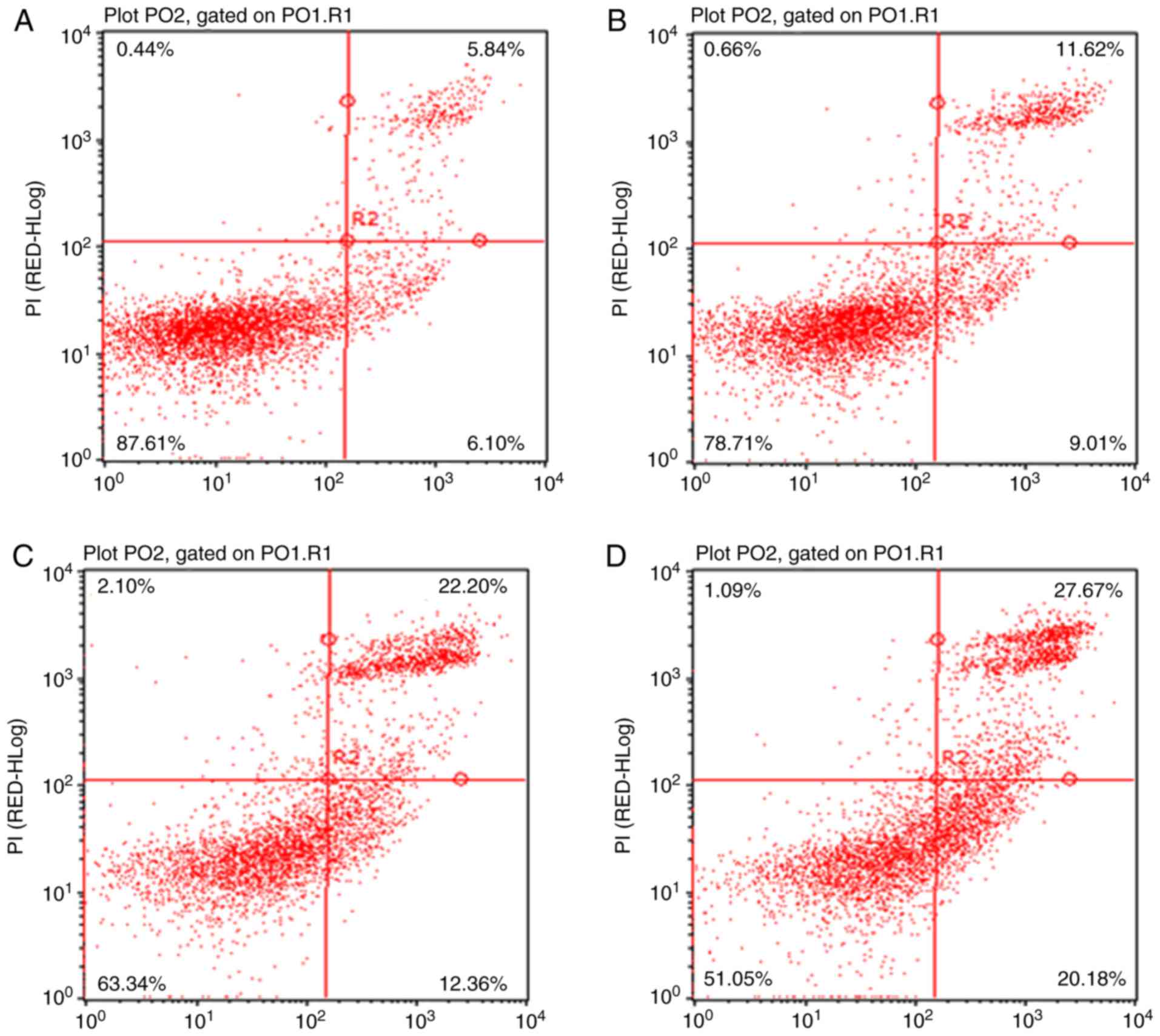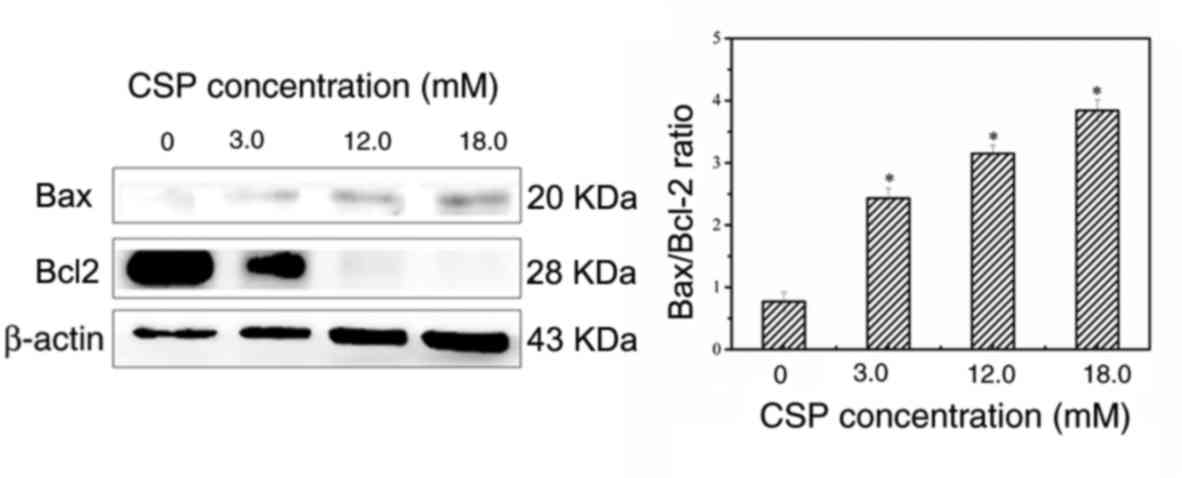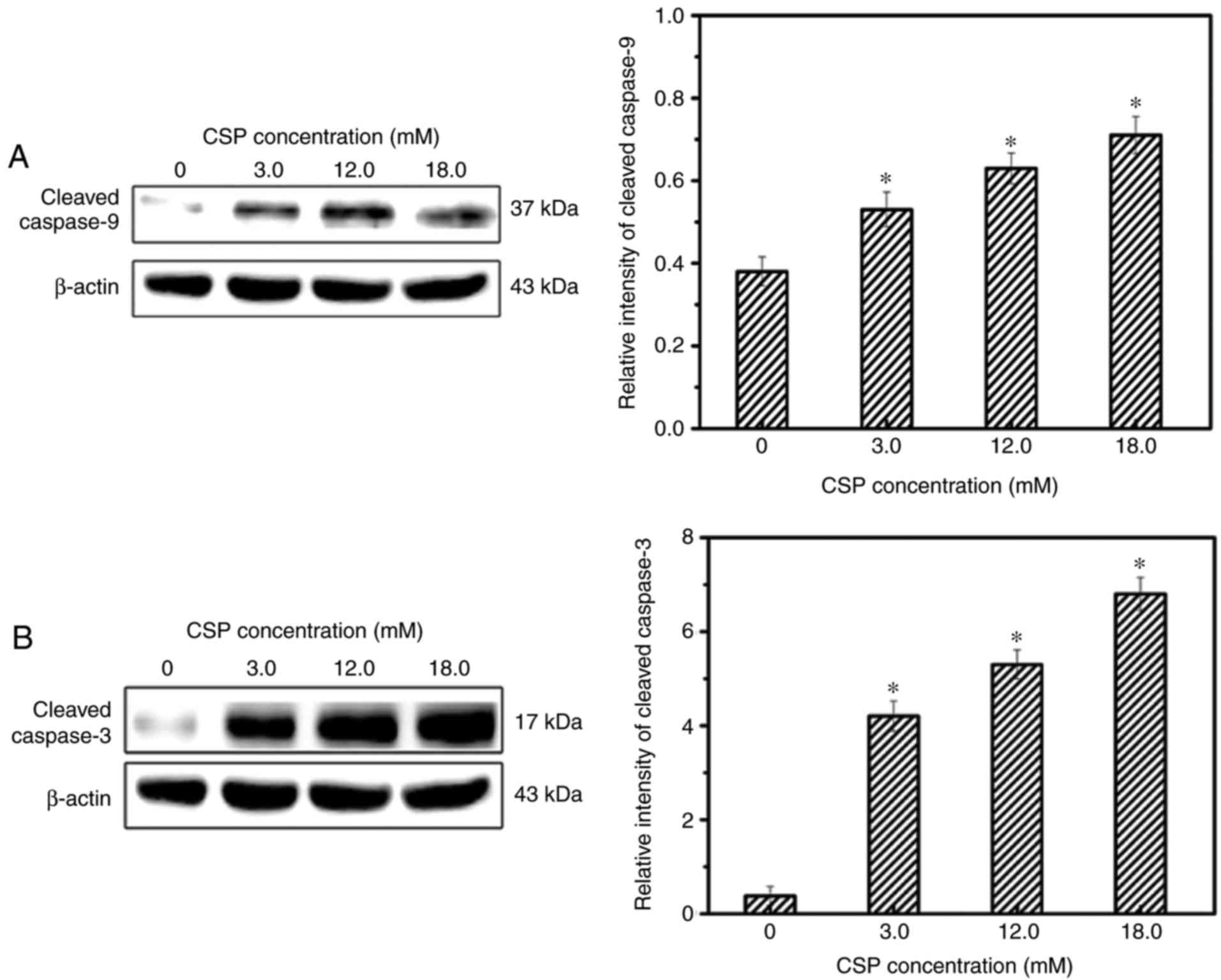|
1
|
Torre LA, Bray F, Siegel RL, Ferlay J,
Lortet-Tieulent J and Jemal A: Global cancer statistics, 2012. CA
Cancer J Clin. 65:87–108. 2015. View Article : Google Scholar : PubMed/NCBI
|
|
2
|
Choo GS, Lee HN, Shin SA, Kim HJ and Jung
JY: Anticancer effect of fucoidan on DU-145 prostate cancer cells
through inhibition of PI3K/Akt and MAPK pathway expression. Mar
Drugs. 14:E1262016. View Article : Google Scholar : PubMed/NCBI
|
|
3
|
Zhou Y, Ji Z, Yan W, Zhou Z and Li H: The
biological functions and mechanism of miR-212 in prostate cancer
proliferation, migration and invasion via targeting Engrailed-2.
Oncol Rep. 38:1411–1419. 2017. View Article : Google Scholar : PubMed/NCBI
|
|
4
|
Hu MB, Bai PD, Wu YS, Zhang LM, Xu H, Na
R, Jiang HW and Ding Q: Higher body mass index increases the risk
for biopsy-mediated detection of prostate cancer in Chinese men.
PloS One. 10:e01246682015. View Article : Google Scholar : PubMed/NCBI
|
|
5
|
Guo L, Min Y, Zhong J, Wu H, Pan J, Gong
W, Wang M, Fei F and Hu R: Stroke risk among patients with Type 2
diabetes mellitus in Zhejiang: A population-based prospective study
in China. Int J Endocrinol. 2016:63806202016. View Article : Google Scholar : PubMed/NCBI
|
|
6
|
Karantanos T, Corn PG and Thompson TC:
Prostate cancer progression after androgen deprivation therapy:
Mechanisms of castrate resistance and novel therapeutic approaches.
Oncogene. 32:5501–5511. 2013. View Article : Google Scholar : PubMed/NCBI
|
|
7
|
Fizazi K, Scher HI, Molina A, Logothetis
CJ, Chi KN, Jones RJ, Staffurth JN, North S, Vogelzang NJ, Saad F,
et al: Abiraterone acetate for treatment of metastatic
castration-resistant prostate cancer: Final overall survival
analysis of the COU-AA-301 randomised, double-blind,
placebo-controlled phase 3 study. Lancet Oncol. 13:983–992. 2012.
View Article : Google Scholar : PubMed/NCBI
|
|
8
|
Schrader AJ, Boegemann M, Ohlmann CH,
Schnoeller TJ, Krabbe LM, Hajili T, Jentzmik F, Stoeckle M,
Schrader M, Herrmann E and Cronauer MV: Enzalutamide in
castration-resistant prostate cancer patients progressing after
docetaxel and abiraterone. Eur Urol. 65:30–36. 2014. View Article : Google Scholar : PubMed/NCBI
|
|
9
|
Chi CF, Hu FY, Wang B, Li T and Ding GF:
Antioxidant and anticancer peptides from the protein hydrolysate of
blood clam (Tegillarca granosa) muscle. J Funct Foods.
15:301–313. 2015. View Article : Google Scholar
|
|
10
|
Pan X, Zhao YQ, Hu FY, Chi CF and Wang B:
Anticancer activity of a hexapeptide from Skate (Raja
porosa) cartilage protein hydrolysate in HeLa Cells. Mar Drugs.
14:E1532016. View Article : Google Scholar : PubMed/NCBI
|
|
11
|
Zhang Z, Gao L, Shen C, Rong M, Yan X and
Lai R: A potent anti-thrombosis peptide (vasotab TY) from horsefly
salivary glands. Int J Biochem Cell Biol. 54:83–88. 2014.
View Article : Google Scholar : PubMed/NCBI
|
|
12
|
Wang B, Wang YM, Chi CF, Luo HY, Deng SG
and Ma JY: Isolation and characterization of collagen and
antioxidant collagen peptides from scales of Croceine Croaker
(Pseudosciaena crocea). Mar Drugs. 11:4641–4661. 2013.
View Article : Google Scholar : PubMed/NCBI
|
|
13
|
Pan X, Zhao YQ, Hu FY and Wang B:
Preparation and identification of antioxidant peptides from protein
hydrolysate of skate (Raja porosa) cartilage. J Funct Foods.
25:220–230. 2016. View Article : Google Scholar
|
|
14
|
Wang X, Xing R, Chen Z, Yu H, Li R and Li
P: Effect and mechanism of mackerel (Pneumatophorus
japonicus) peptides for anti-fatigue. Food Funct. 5:2113–2119.
2014. View Article : Google Scholar : PubMed/NCBI
|
|
15
|
Zhao YQ, Zeng L, Yang ZS, Huang FF, Ding
GF and Wang B: Anti-fatigue effect by peptide fraction from protein
hydrolysate of Croceine Croaker (Pseudosciaena crocea) swim
bladder through inhibiting the oxidative reactions including DNA
damage. Mar Drugs. 14:2212016. View Article : Google Scholar :
|
|
16
|
Ovchinnikova TV, Aleshina GM, Balandin SV,
Krasnosdembskaya AD, Markelov ML, Frolova EI, Leonova YF, Tagaev
AA, Krasnodembsky EG and Kokryakov VN: Purification and primary
structure of two isoforms of arenicin, a novel antimicrobial
peptide from marine polychaeta Arenicola marina. FEBS Lett.
577:209–214. 2004. View Article : Google Scholar : PubMed/NCBI
|
|
17
|
Sperstad SV, Haug T, Blencke HM, Styrvold
OB, Li C and Stensvåg K: Antimicrobial peptides from marine
invertebrates: Challenges and perspectives in marine antimicrobial
peptide discovery. Biotechnol Adv. 29:519–530. 2011. View Article : Google Scholar : PubMed/NCBI
|
|
18
|
Huang F, Yang ZS, Yu D, Wang J, Li R and
Ding G: Sepia ink oligopeptide induces apoptosis in prostate cancer
cell lines via caspase-3 activation and elevation of Bax/Bcl-2
ratio. Mar Drugs. 10:2153–2165. 2012. View Article : Google Scholar : PubMed/NCBI
|
|
19
|
Song R, Wei R, Zhang B, Yang Z and Wang D:
Antioxidant and antiproliferative activities of heated sterilized
pepsin hydrolysate derived from half-fin anchovy (Setipinna
taty). Mar Drugs. 9:1142–1156. 2011. View Article : Google Scholar : PubMed/NCBI
|
|
20
|
Kim EK, Hwang JW, Kim YS, Ahn CB, Jeon YJ,
Kweon HJ, Bahk YY, Moon SH, Jeon BT and Park PJ: A novel bioactive
peptide derived from enzymatic hydrolysis of Ruditapes
philippinarum: Purification and investigation of its
free-radical quenching potential. Process Biochem. 48:325–330.
2013. View Article : Google Scholar
|
|
21
|
Jiang C, Xiong Q, Gan D, Jiao Y, Liu J, Ma
L and Zeng X: Antioxidant activity and potential hepatoprotective
effect of polysaccharides from Cyclina sinensis. Carbohyd
Polym. 91:262–268. 2013. View Article : Google Scholar
|
|
22
|
Jiang C, Xiong Q, Li S, Zhao X and Zeng X:
Structural characterization, sulfation and antitumor activity of a
polysaccharide fraction from Cyclina sinensis. Carbohyd
Polym. 115:200–206. 2015. View Article : Google Scholar
|
|
23
|
Jiang C, Wang M, Liu J, Gan D and Zeng X:
Extraction, preliminary characterization, antioxidant and
anticancer activities in vitro of polysaccharides from Cyclina
sinensis. Carbohyd Polym. 84:851–857. 2011. View Article : Google Scholar
|
|
24
|
Yan HQ, Teng FF, Liu ZX, Huang FF, Yang ZS
and Ding GF: Anticancer activity of peptides isolated from
hydrolysates of Cylcina sinensis. J Anhui Agri Sci.
42:3576–3577. 2014.
|
|
25
|
Tang Y, Yu F, Zhang G, Yang Z, Huang F and
Ding G: A purified serine protease from Nereis virens and its
impaction of apoptosis on human lung cancer cells. Molecules.
22:E11232017. View Article : Google Scholar : PubMed/NCBI
|
|
26
|
Song R, Wei RB, Luo HY and Yang ZS:
Isolation and identification of an antiproliferative peptide
derived from heated products of peptic hydrolysates of half-fin
anchovy (Setipinna taty). J Funct Foods. 10:104–111. 2014.
View Article : Google Scholar
|
|
27
|
Kim EK, Kim YS, Hwang JW, Lee JS, Moon SH,
Jeon BT and Park PJ: Purification and characterization of a novel
anticancer peptide derived from Ruditapes philippinarum.
Process Biochem. 48:1086–1090. 2013. View Article : Google Scholar
|
|
28
|
Ibrahim B, Sowemimo A, Spies L, Koekomoer
T, Venter MVD and Odukoya OA: Antiproliferative and apoptosis
inducing activity of Markhamia tomentosa leaf extract on HeLa
cells. J Ethnopharmacol. 149:745–749. 2013. View Article : Google Scholar : PubMed/NCBI
|
|
29
|
Deng X, Qiu Q, Yang B, Wang X, Huang W and
Qian H: Design, synthesis and biological evaluation of novel
peptides with anti-cancer and drug resistance-reversing activities.
Eur J Med Chem. 89:540–548. 2015. View Article : Google Scholar : PubMed/NCBI
|
|
30
|
Ma J, Huang F, Lin H and Wang X: Isolation
and purification of a peptide from Bullacta exarata and its
impaction of apoptosis on prostate cancer cell. Mar Drugs.
11:266–273. 2013. View Article : Google Scholar : PubMed/NCBI
|
|
31
|
Yang Z, Zhao Y, Yan H, Xu L, Ding G, Yu D
and Sun Y: Isolation and purification of oligopeptides from
Ruditapes philippinarum and its inhibition on the growth of
DU-145 cells in vitro. Mol Med Rep. 11:1063–1068. 2015.
View Article : Google Scholar : PubMed/NCBI
|
|
32
|
Kuwana T and Newmeyer DD: Bcl-2-family
proteins and the role of mitochondria in apoptosis. Curr Opin Cell
Biol. 15:691–699. 2003. View Article : Google Scholar : PubMed/NCBI
|
|
33
|
Mcilwain DR, Berger T and Mak TW: Caspase
functions in cell death and disease. Cold Spring Harb Perspect
Biol. 5:a0086562013. View Article : Google Scholar : PubMed/NCBI
|
|
34
|
Kumar S: Caspase function in programmed
cell death. Cell Death Differ. 14:32–43. 2007. View Article : Google Scholar : PubMed/NCBI
|















